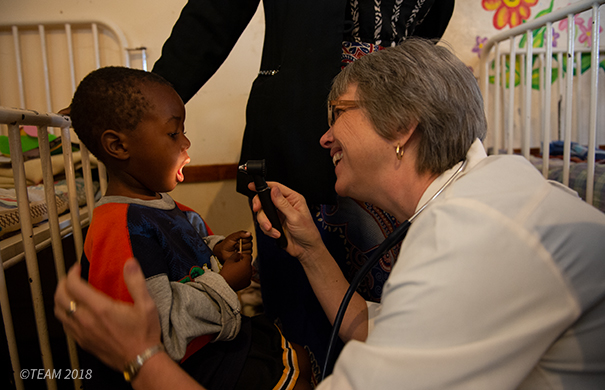
Becoming a Missionary
When It Comes to Missions, God Can Use Your Baby Steps
September 17, 2018
by admin

Kiersten Hutchinson was the perfect missionary candidate: She’d gone on short-term mission trips for years. She attended the Urbana missions conference, not once but twice. She led her church’s mission board and ran missions conferences.
“If anyone asked about me, it was, ‘Oh yeah, she’s well on her way to missions,’” Kiersten says. “You know, no questions.”
And that’s what Kiersten thought, too.
Until it was actually time for her first two-year assignment.
Suddenly, the confident 20-something was gripped with fear that wouldn’t budge. Two years in Zimbabwe was simply too much. And soon, she called her sending agency, TEAM, with a change of plans.
The missions world has long debated whether short-term mission trips really lead to long-term missions.
Maybe they’ll make the leap, people say. Or maybe they’ll enjoy a weeklong trip to an exotic locale and live off the spiritual high for months — maybe years. They’ll talk about long-term missionary service, but when it comes down to it, they won’t know how to make the big sacrifice.
That easily could have been the case for Kiersten. But as it turns out, she didn’t need fewer short-term mission trips. She needed more.
A Promising Start
Kiersten started her missionary journey at Urbana, a massive missions conference for young adults.
As she listened to one of the speakers, Kiersten thought, I could see myself doing this. She left the session and made a beeline for the exhibit hall, where all the missions agencies had set up booths.
She went on her first short-term mission trip to Zaire (now the Democratic Republic of the Congo) the next summer. From there, she was hooked.
After college, Kiersten joined her church’s missions committee and helped run conferences. When she went back to school to become a physician assistant, she organized medical mission trips to Mexico.
Kiersten thought the short-term trips would help keep her passion for missions alive. But God had even deeper plans.
Discovering Herself through Short-Term Missions

Going on short-term mission trips helped Kiersten envision what a life in full-time missions could look like.
Kiersten worked at a bush hospital in Zaire. In Mexico and Ecuador, she served at small clinics. And on each mission trip, she learned a little more about who she was, and where she could serve best.
“If you go on a couple different trips,” Kiersten says, “you realize that fields are different, agencies are different, missionaries are different, and it gives you a better opportunity to have more appropriate expectations.”
Kiersten has mild depression, so she realized she needed to be part of a team rather than work alone. She believes in treating the whole person, so she needed a medical post that would give her that freedom. She’s outspoken, so she needed a culture where her personality would be welcome.
But it wasn’t just her own strengths and weaknesses that came to light. She learned which agencies offered more or less structure. She saw how unmarried people were treated. She saw each agency’s priorities.
By the time Kiersten graduated from physician assistant school and paid off her loans, she had a good idea of what she was looking for. And TEAM was a great match.
“TEAM put the person ahead of the work — even the work for God. … So that was very important to me, that they valued me more than the work I could do for them,” Kiersten says. TEAM felt like a family, not a corporation.
So, she joined TEAM and signed up for a two-year missionary term at a hospital in Zimbabwe.
And that’s when fear took over.
Fighting Her Long-Term Call
For years, Kiersten had told God she would go anywhere He sent her. But without realizing it, she had added a condition: She would go anywhere God sent her — and her husband. And as her missionary term in Zimbabwe drew nearer, Kiersten remained single.
In her mind, Kiersten had kept up her end of the deal. She was ready to go. God was the one who had failed to bring her a spouse.
“If you had asked me this before, … I would not have guessed that this would be the way I would feel,” Kiersten says. “And so, I had this incredible attack of fear of going somewhere ‘by myself.’”
God patiently reminded Kiersten that she wasn’t going alone, not if she went with Him. He would provide all she needed.
But Kiersten was ready with another objection.
“I’ve been told that I have a strong personality. … I was, again, too afraid to come to a mission field that might hate me — that my personality might be too much,” Kiersten says.
She thought about going for two months, just to see what the people were like. But Kiersten quickly threw out that idea, too.
How could she waste her supporters’ money — waste God’s money — on a two-month stint that cost the same as going for two years?
But as Kiersten prayed, she sensed God speaking loud and clear: “God just really had to say, ‘You know, Hutchinson, I am God, and money actually is not a problem for me. Obedience and a willing heart in my children are really much more difficult than raising money.’”
And so, Kiersten obeyed. She called TEAM, changed her trip details and flew to Zimbabwe.
Short-Term Trips Led to Long-Term Missions
In two months, God’s love and grace conquered Kiersten’s fears about serving in long-term missions.
Kiersten loved her work at Karanda Hospital. The missionary team was supportive and treated their single members with respect. They thought Kiersten had a great personality.
Kiersten found herself thinking, I can see myself living here until I retire. And when she got home, that’s what she started working toward.
She raised her long-term missionary support. And 18 years later, she’s still going strong in Zimbabwe.
Kiersten may not have rushed to the mission field with fearless abandon, but God saw her baby steps as acts of obedience. And by His grace, timid faith can lay the foundation for a lifetime of ministry.
Related articles

